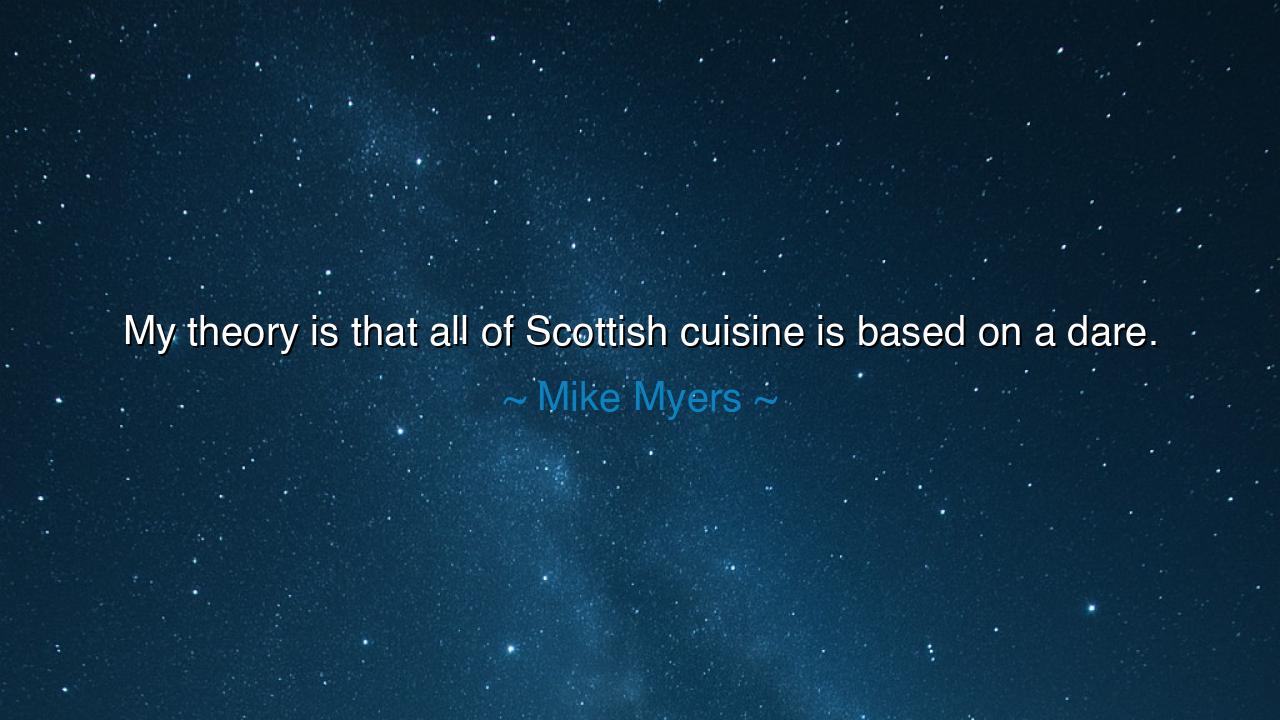
My theory is that all of Scottish cuisine is based on a dare.






When Mike Myers humorously claimed, “My theory is that all of Scottish cuisine is based on a dare,” he wasn’t merely making a lighthearted comment about the eccentricities of Scottish food; he was pointing to a deeper, almost heroic quality in the Scottish spirit — a quality that faces adversity not with timidity, but with boldness and defiance. Scottish cuisine, often criticized for its rugged and unconventional ingredients, reflects a culture that has long thrived on overcoming harsh environments and surviving in conditions that demand ingenuity, resilience, and courage. To understand Myers' quote is to understand the Scottish people’s ability to turn necessity into adventure, embracing the unknown with a spirit that dares to ask, "What if we could make something extraordinary out of the ordinary?"
Historically, the Scots have faced some of the harshest living conditions in Europe. From the windswept Highlands to the rugged lowlands, the Scottish climate has been far from forgiving, demanding resourcefulness from its people. In the face of such adversity, Scottish cuisine evolved not out of luxury, but out of necessity. The infamous haggis, made from sheep’s offal mixed with oats, is a prime example of how Scots have turned the utilization of available resources into a source of national pride. It’s a dish that could be described as brave, a concoction born not from a place of indulgence, but from a place of making do with what was at hand, creating something hearty and nourishing in the process. The Scots, it seems, have always been willing to push the limits of convention — to transform the unappealing into something admirable.
The act of creating something like haggis out of necessity is not unlike the mythological heros of ancient times, who often found themselves in impossible situations and managed to emerge victorious by sheer force of will and resourcefulness. Just as Hercules was tasked with completing twelve nearly impossible labors, so too did the Scots face a labor of survival — and yet, they did not simply survive; they thrived. They found a way to make the very environment that could have been seen as inhospitable work for them. The same spirit that drove them to develop their cuisine drove them to conquer the challenges of their rugged land, turning what could have been mere endurance into a form of cultural expression.
In myth and history, the theme of daring in the face of adversity is recurrent. Think of Ulysses, whose adventures were not born of comfort but out of his determination to return home. His journey was not just a series of trials; it was a celebration of the human will to face the unknown with a defiant spirit. The Scots, like Ulysses, never shrank from their challenges but instead embraced them. Their cuisine, though strange to outsiders, reflects the boldness of a people who faced their environment not with reluctance but with the desire to turn hardship into triumph. Thus, Myers’ remark about Scottish food being based on a dare is not merely humorous; it is a tribute to the daring heart of Scotland itself.
What is the true meaning of Myers' quote? It is not only a jest about the oddities of food; it speaks to the underlying character of the Scottish people, who have, throughout history, been defined by their ability to take on challenges with a boldness that borders on defiance. In every strange dish they created, there is a lesson: facing difficulty head-on, and even embracing it with a sense of humor, is the path to transforming hardship into something powerful and enduring. The Scots did not just accept their land’s challenges; they made those challenges work for them, much like ancient warriors transformed the battlefield into an arena where their skill and courage shone.
The lesson in Myers' words for us today is one of resilience and creativity. Life often presents us with situations that seem uncomfortable, difficult, or even impossible. We may face obstacles that seem as strange and unappealing as haggis to an outsider. But the lesson from the Scots, and from Myers' humorous reflection, is that there is strength in daring to confront those challenges head-on, in turning the unappealing into something of value. The power of transformation lies in perspective: rather than avoiding difficulty or fearfully resisting it, we must embrace it as an opportunity to create, to adapt, and to emerge stronger.
The practical actions we should take from this wisdom are clear. First, we must face adversity with creativity and resolve. Just as the Scots transformed their environment into something that could nourish them, we too can transform our challenges into stepping stones for growth. Second, we must embrace resourcefulness in our daily lives. Like the ancient hero, we must use everything at our disposal to overcome obstacles, whether that be our creativity, our community, or our willpower. Finally, we must remember the value of humor and lightness in times of hardship. The Scots did not simply endure; they found a way to celebrate their challenges, turning them into traditions that endure to this day.
For as Mike Myers so wisely, and humorously, reminds us, daring in the face of adversity is not only the spirit of Scottish cuisine, but the spirit of life itself. It is not the absence of difficulty that defines us, but how we choose to meet it — with boldness, humor, and the creativity to transform what seems impossible into something deeply meaningful.






AAdministratorAdministrator
Welcome, honored guests. Please leave a comment, we will respond soon